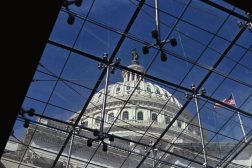Bipartisan bill aimed at enhancing NOAA’s AI use reintroduced in House, Senate

A bipartisan coalition of lawmakers reintroduced a bill that would require the National Oceanic and Atmospheric Administration to take several actions to support the use of AI forecasting and weather models.
Among the action items for NOAA under the Transformational Artificial Intelligence to Modernize the Economy against Extreme Weather and Wildfires Act (TAME Extreme Weather and Wildfires Act): developing a dataset to train AI forecasting models, supporting the deployment of AI weather models into forecasts, and partnering with private sector and academia on AI weather and wildfire forecasting.
The bill (S. 1378; H.R. 2770) was initially introduced in the House and Senate last Congress but didn’t advance out of either chamber. The legislation did, however, advance out of the Senate Commerce, Science, and Transportation Committee in July as an amendment to the Fire Ready Nation Act. The new legislation remains largely unchanged but adds a focus on wildfires.
“Our bill will harness AI’s immense processing and prediction capabilities to improve weather forecasts and help communities better prepare for and respond more quickly to extreme weather events,” Brian Schatz, D-Hawaii, who sponsors the legislation, said in a statement.
The Senate bill’s other co-sponsors are Sens. Tim Sheehy, R-Mont., Peter Welch, D-Vt., and Ben Ray Luján, D-N.M. The House bill is sponsored by Rep. Scott Franklin, R-Fla.
According to a press release from Schatz and Franklin on the reintroductions, the U.S. experienced 28 disasters in 2023 alone that caused 500 deaths and cost at least $1 billion in damages. Moreover, current AI models for weather rely on a European-based dataset.
“By encouraging American innovation and uniting the efforts of the federal government, academia and the private sector, our bill ensures we can respond swiftly to natural disasters here at home without relying on foreign data,” said Franklin, who chairs the House Science, Space and Technology Committee’s Environment Subcommittee.
NOAA scientists also see AI as a potentially useful and powerful tool to harness for the agency’s work. In interviews with FedScoop, NOAA officials have cited AI as a technology that could help the agency gain efficiencies and may even support important work like tracking and monitoring hurricanes.






